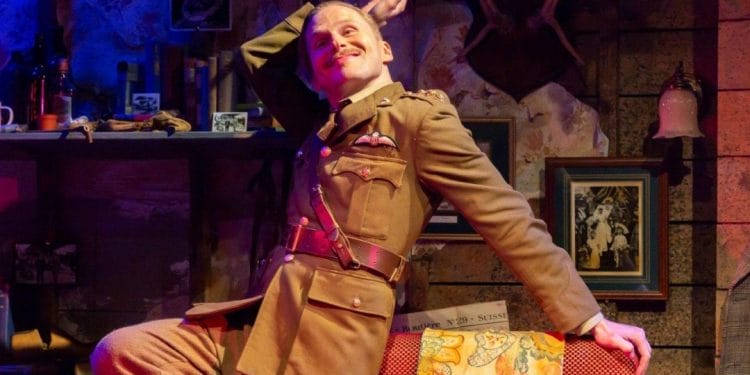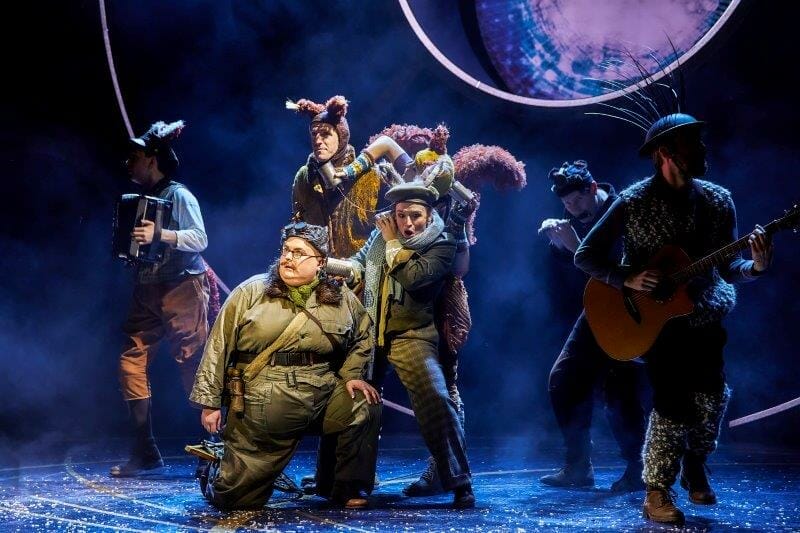 For Canadians, larger than life Billy Bishop is a national hero, having being dispatched to Britain to fight in the First World War, he went from military school flunk to ace pilot in the Royal Flying Corps. There’s an airport named after him in Toronto, but he lives on across the country in Canada’s most performed play, Billy Bishop Goes to War, written by John Gray in collaboration with Eric Peterson, which now under the direction of Jimmy Walters, transfers to Southwark Playhouse following a run at Jermyn Street Theatre.
For Canadians, larger than life Billy Bishop is a national hero, having being dispatched to Britain to fight in the First World War, he went from military school flunk to ace pilot in the Royal Flying Corps. There’s an airport named after him in Toronto, but he lives on across the country in Canada’s most performed play, Billy Bishop Goes to War, written by John Gray in collaboration with Eric Peterson, which now under the direction of Jimmy Walters, transfers to Southwark Playhouse following a run at Jermyn Street Theatre.
The story is told in the form of a reflection, the story is being told first hand, but also through letters to Bishop’s beloved Margaret. Two actors portray Billy Bishop, Charles Aitken plays the younger Billy, while Oliver Beamish takes the form of an older Billy looking back at life, but both versions of the character are on stage simultaneously, sharing the role and the life of ‘Bish’.
The rapport between the two actors is exceptional, while much of the attention is on Aitken, his companion Beamish sits at the piano just as enraptured in the action as we are, often mirroring Aitken’s movements, always taking a swig of Pipers Whisky at the same time. Both actors take on a variety of different characters, and accents, from Aitken’s Lady St Helier to Beamish’s upper class officers, and judgemental butler. This is really a play with music, rather than a musical, with Oliver Beamish in command of the piano, and the single source of score throughout. The tunes are simple and melodic, yet unbelievably moving at times.
The young Billy tells us at the outset he’s a liar, so there’s always an air of doubt hanging over the extraordinary tales he spins, but they are so thrilling and told with such unwavering conviction that any trace of doubt is swept away in the tailwind of the excitement. Charles Aitken interacts and flirts with his audience, bringing them in to the fold at every available opportunity, and reminding us what a charming rogue the character was.
Daisy Blower’s fantastically detailed set evokes the sense of a life that has been lived, mementos and curios crammed into every available spot in a space that reminded me of the kind of garden shed a retired hero might occupy to relive his memories. The lighting design too, from Arnim Friess, helps to create the right ambience, particularly in the flying scenes. It’s this staging which helps give Billy Bishop Goes to War that intimate feel, making it feel less of a stage performance and more like you are sitting in that garden shed, hearing the stories first hand from the man himself.
There are many moments of comedy, usually to be found when the actors are portraying these other characters but often without warning the narrative barrel rolls into something evocative, beautiful and touching. Aside from the narrative and songs, the play is laced with poetry, which is most evident in a segment where Bishop recounts the exploits of his British equivalent.
Expertly directed by Jimmy Walters, the delivery is slick and the two-hour running time flies past as you wish you could hear more about Billy’s fascinating exploits. Charles Aitken performs with so much energy and passion you cannot help but be totally caught up in the story, and the sharing of the character with Oliver Beamish works extremely well. Billy Bishop Goes to War is funny, moving and filled with excitement that audiences of any age can enjoy.





















